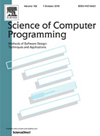Science of Computer Programming will be dedicated to the distribution of research results in the areas of software systems development, maintenance and use, including the software aspects of hardware design. The journal has a wide scope ranging from the many facets of methodological foundations to the details of technical issues and the aspects of industrial practice. The subjects of interest to SCP cover the entire spectrum of methods for the entire life cycle of software systems, including requirements, specification, design, validation, verification, coding, testing, maintenance, metrics and renovation of software; design, implementation and evaluation of programming languages; programming environments, development tools, visualisation and animation; management of the development process; human factors in software. Special emphasis will be given to recent trends in software development, such as software architecture, component-based software development and web-based software engineering. SCP will be divided into five tracks. These are: (1) Concepts and methodology, (2) Formal techniques, (3) Experimental software technology, (4) Descriptive software technology, (5) Speedy publication track. 1) The conceptual track is open for methodological, philosophical and sociological studies on all aspects of computer software production andusage, including ethics. 2) The formal track emphasizes the development and the pragmatic application of formal and semiformal techniques. Submissions which the editors consider mainly mathematical or theoretical in nature, with the preliminary consent of the authors, will normally be forwarded to the sister journal TCS. 3) The experimental track is open for expositions on implementations of and experiments with novel programming languages, systems and methods. It must be emphasized that papers describing new software tools of relevance to SCP are welcome under the strict condition that the source code of the tools is open. 4) The descriptive track deals with observational studies of current software development practices, reporting on new languages, systems and methods, including survey reports on the various themes. 5) The speedy track is a meta-track for the fast publication of particularly valuable new ideas and results, providing the opportunity of reaching a wide audience within the time limits normally offered by conference proceedings, within about six months from submission, with a notice of acceptance or rejection within three months. The related submissions have to be sent directly to both the editors in chief and are subject to a page limit. It is a firm policy of the journal to achieve a balance among the different tracks, as much as possible and within a reasonable time limit.
